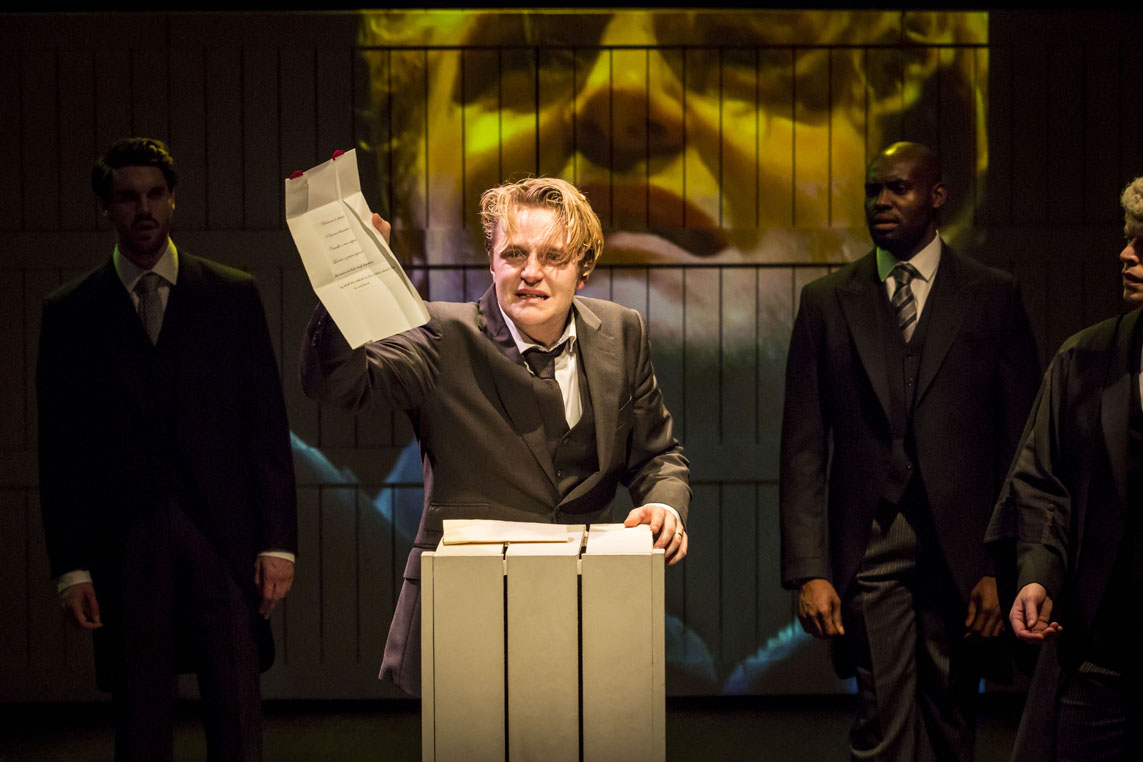
I can remember on first reading The Winter’s Tale, weeping at the description of the reunions between sundered friends and lost family. For a decidedly chilly, at times bleak and brutal play there were seams here of deep emotion, to which we might add (mixing our metaphors) the complex web of themes, Shakespeare, in the glory of his late harvest had freely woven into his reworking of Greene’s prose romance.
The problems for the director are numerous: how to make the ‘sudden’ jealousy of Leontes (Orlando James) appear convincing whilst being nonetheless fantastical, how to manage the numerous changes of gear that are marked throughout the play, and which of the themes to privilege for a contemporary audience – to name but three. And then of course the notorious sixteen-year gap elided by Time personified (Grace Andrews). How, we wonder, will they unleash the power of that tensioned spring between what Leontes believes and what we know to be the case concerning his daughter, Perdita (Eleanor McLoughlin)
Dispensing with Act 1 Sc.i Declan Donnellan takes us straight to a scene in which a couple of present day ‘lads’ are larking about with an easy familiarity, which suggests what is omitted from 1.i, namely a long and close friendship. The temporary madness that overcomes Leontes is managed by the clever use of a surreal technique in which time is stopped for the other actors on stage whilst Leontes arranges them to fit his fevered, jealous imagination. What we get is a tyrannical control freak who refuses to see what is actually in front of him until it bites him on the nose and drags him (literally) to the ground after the supernatural intervention of Apollo.
The bucolic scenes of Bohemia are transposed to rural Eire where we discover Perdita, as delightful a colleen as ever managed a farm and where Ryan Donaldson’s roguish Autolycus is as much a part of the rustic furniture as the Shepherd and his son. What we don’t get, thankfully, is the suggestion that it is somehow Perdita’s royal blood that explains the transformative effect her presence has had on the fortunes of the shepherd. Nor indeed is a magical chastity ever in the frame, particularly as she and Florizel (Sam Woolf) had seemed eager to get down to some pre-nuptial jig-a-jig only to be interrupted by his (disguised) dad, Polixenes (Edward Sayer). Her queenliness comes from something deeper, more anchored in a natural ‘royalty’.
It is indeed the women of the play who form its backbone, steadfast honest and true. Joy Richardson’s pushy Paulina, unflinchingly telling truth to power and constant, through the sixteen years, in her support of Hermione. Natalie Radmall-Quirke bears the humiliation of Hermione with impressive dignity, which in the final scene of reconciliation is overlaid with a restrained depth of emotion that somehow rounds out the themes of the play.
Nick Ormerod’s spare, porta-barn of a set allows the play to breath whilst offering enough adaptability to allow the scenes to flow in time and space.
Mr Donnellan has come up with a modern interpretation of Shakespeare that has depth, sensitivity and clarity. Fit indeed for the twenty-first century road. ★★★★☆ Graham Wyles at the Theatre Royal, Bath on 23rd February 2017
Photo Credit: Johan Persson

